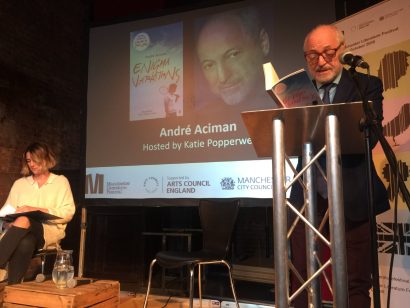 MLF Chapter & Verse
MLF Chapter & Verse
The Manchester Literature Festival Blog
Review : André Aciman
Our Young Digital Reporter Aisha Sodawala learns about setting and sentimentality at André Aciman’s event.
André Aciman, author of the critically acclaimed novel turned movie ‘Call Me By Your Name’, writes about desire, absence and longing in amazing prose. He never ceases to amaze me with his intricate descriptions of passions linking to innocence.
In his latest novel, Enigma Variations, André presents a character named Paul who, through different stories of his past infatuations, unveils different aspects of his identity. The first introduction that the reader gets to Paul is when he is 12 years old, living with his parents in a summer house in Italy. Katie Popperwell drew attention to the ethical debate around the preservation of innocence within childhood and André, with the same charismatic tone used throughout the entire interview replied, ‘I am not writing as a predatory adult, in fact, I am almost in league with the children who are as predatory to adults’. You can’t ignore the attraction a child feels towards another human. As Freud said, a child’s first case of sexual desire comes at the age of seven and after that phases of sexuality are resurgent until adulthood. André, in his novel, is merely being truthful towards the human experience.
Popperwell then drew attention to André’s fixation on setting throughout his novels, predominantly in relation to sex. In Call Me By Your Name, André sets the novel in Italy where the summers are filled with colour and vibrancy. ‘The sex in Italy is much more meaningful. In Manhattan, the sex would seem too cerebral’. André explained how the setting is so important in not only the story but also the journey of the relationships presented in his novels.
Leading on from this, Popperwell asked André whether he felt the same awkwardness as others do when writing sex scenes. He laughed and replied ‘of course’. He then continued to explain that when writing sex scenes it is difficult and when writers’ sex scenes are seen as terrible it’s usually because they try and make the scenes too graphic. André then went on to say that although the sex scene in Call Me By Your Name is seemingly graphic, he focused on Elio having smoked pot before sex which means that his narrative would be slightly blurred. This blurring of perspective then allowed him to be as graphic as he wanted; ‘I needed obliviation in order to make it graphic’.
One of the main aspects of André’s writing style is sentimentalism. He said that ‘you want to fantasise but also foresee that they might have something about them that is wrong. You want to focus on the defects. Everyone I desire isn’t the most perfect person, I look for defects’.
